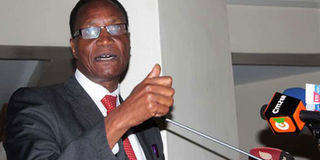Poor education, insecurity pulls down Kenya governance ranking

Education Cabinet Secretary Jacob Kaimenyi at a past event. PHOTO | JAMES EKWAM | NATION MEDIA GROUP
What you need to know:
- In this year’s Ibrahim Index of African Governance (IIAG), Kenya has improved in the overall score in provision of public goods.
- IIAG is an annual assessment of performance for each of the 54 African countries by the Mo Ibrahim Foundation.
- This observation comes as the public in Kenya debates the quality of education offered in government institutions.
Kenya’s worsening quality of education and national security challenges are pulling back its bid to improve the quality of life for the citizens, a new governance report shows.
In this year’s Ibrahim Index of African Governance (IIAG), Kenya has improved in the overall score in the provision of public goods, but the quality of education offered to children and personal safety have declined.
“Kenya’s performance is largely positive, with a rank of 14th on the continent in overall governance.
“This good positioning within the rankings is complemented by the progress the country has made in overall governance since 2011,” the Index report states.
IIAG is an annual assessment of performance for each of the 54 African countries by the Mo Ibrahim Foundation.
The 2015 IIAG consists of 93 indicators, which fall into four categories: safety and rule of law, participation and human rights, sustainable economic opportunity and human Development.
ASSESSING QUALITY
But it adds that public education offered to children has deteriorated over the past four years “as a result of downward trajectories” in several indicators used in assessing quality.
These include the system of education and the ratio of pupils to teachers. In the latter, Kenya has reported the worst decline in Africa even though the level of literacy and enrolment have improved.
This observation comes as the public in Kenya debates the quality of education offered in government institutions.
Though basic education has seen enrolment rise beyond 85 per cent, this has lowered the public school teacher-to-pupil ratio, which now stands at 1:43.
Regarding higher education, the challenge is the same as universities get crowded.
Worse still, in figures sourced from 33 international organisations, the Index shows that Kenya’s level of personal safety and national security have deteriorated.
Personal safety and human rights are measures of how all individuals are protected from both internal and external threats to the peace alongside the existence of a robust legal system and transparent, effective and accessible institutions, within all branches of the state.
“Kenya has exhibited both low and falling scores in personal safety and national security. In the former, Kenya ranks 35th on the continent, with a score of 39.1, lower than the African average.”
HUMAN TRAFFICKING
Kenya’s fall in security, according to the report, is informed by its unimplemented policies to curb human trafficking.
Since 2011, Kenya has dropped 25 points as incidents of human trafficking increase.
Last month, the US State Department listed Kenya among countries that serve as transit points and destinations for human trafficking.
The State Department stated: “Kenyans voluntarily migrate to other East African nations, South Sudan, Europe, the US and the Middle East — particularly Saudi Arabia and Oman — in search of employment where at times they are exploited in domestic servitude, massage parlours and brothels or forced manual labour.”
But it is not all gloom for Kenya. It is among 33 countries labelled as “rising potential powerhouses” for generally being the most improved in their governance since 2011.
Though the overall progress has stagnated continentally, Kenya’s best score is in providing sustainable economic opportunity to citizens.
With newer roads built and improved business environment, Kenya ranks tenth in Africa in this category even though its competitive environment has stalled for investors.
Kenya has also recorded improvement in rule of law and accountability, especially after the judiciary became more independent, the Index notes.
More freedom granted through the constitution and improved property rights have enabled the country to rise on public participation and human rights index.
Activists may, however, be quick to point out that the Jubilee government has passed certain laws in the past to cut back on those freedoms. They may also point out that the cost of justice in Kenya has risen since 2011.
HIGHEST RANKING
Regionally, Rwanda is highest ranking country in East Africa in provision of security, sustainable economic opportunity and human development.
Ethiopia is the most improved side in the region in provision of security, mainly because of its aggressive anti-terrorism policies.
But both Rwanda and Ethiopia are doing badly when measured on human rights scale. For example, though Rwanda scores 85 in gender equality, its score in human rights is below 40.
However, two of the worst performers in Africa are from East Africa; Somalia and South Sudan. This means that the region will have to cooperate more to deal with security challenges.
“The 2015 IIAG shows that recent progress in other key areas on the continent has either stalled or reversed, and that some key countries seem to be faltering.
“This is a warning sign for all of us. Only shared and sustained improvements across all areas of governance will deliver the future that Africans deserve and demand,” said Mo Ibrahim, the chairman of the Mo Ibrahim Foundation.




